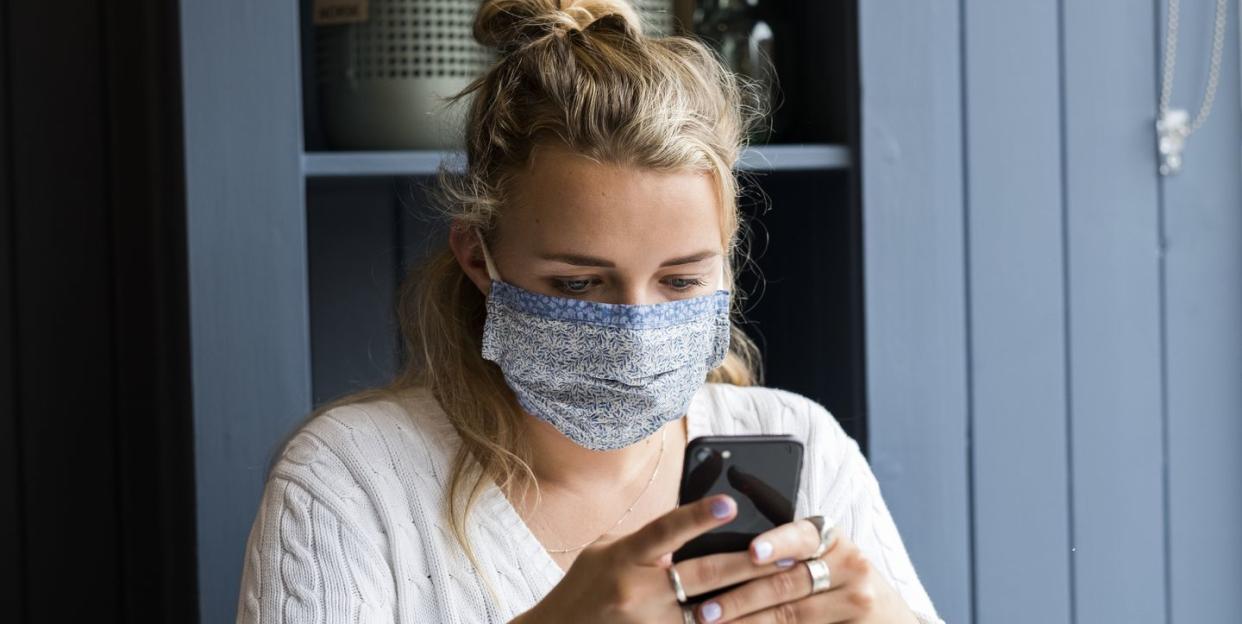Is COVID-22 actually something to be worried about?

- Oops!Something went wrong.Please try again later.
If you've been on the internet at all recently you've probably seen people talking (read: panicking) about COVID-22. The term started trending on Twitter last week after an immunologist mentioned "COVID-22" in an interview with German newspaper, Blick.
"That will be the big problem for the coming year. COVID-22 could get worse than what we are witnessing now," Sai Reddy, PhD told the publication.
Naturally, people on the internet started questioning what exactly is COVID-22 and whether or not we should be worried about it. "Why is #COVID22 trending?" someone tweeted, while another user wrote "Wait, how did I miss COVID-20 and 21? #COVID22."
Why is #COVID22 trending?😭😭 pic.twitter.com/efgb4xxgy8
— ડheena🥑 (@Srivenaa) August 24, 2021
Wait, how did I miss covid 20 and 21? #COVID22 pic.twitter.com/Bkp0UBvfyb
— AmandaS (@Aykaay668) August 23, 2021
Really #COVID22 pic.twitter.com/AMJImmN0e1
— Ben (@nabenoush) August 24, 2021
Why am I seeing #COVID22 trending? pic.twitter.com/aANQthxEl0
— Alesha💋 (@xxAleshawxx) August 23, 2021
With that in mind, we spoke to GP Dr Jeff Foster to clear up any confusion about COVID-22, before everyone starts panic buying toilet paper and stressing over the idea of lockdown 4.0.
What is COVID-22?
In his interview with Blick, Swiss professor and immunologist Sai Reddy, PhD coined the term COVID-22 as an alternative to the variants we've seen in recent months. "The Delta variant is much more contagious," Reddy said, "This is no longer COVID-19. I would call it COVID-21."
He then used the term COVID-22 to refer to an "inevitable" future variant.

Is COVID-22 real?
Experts are doubtful there'll ever be a COVID-22, but to understand why, we need to take a look at how COVID-19 came to be.
Broken down, COVID-19 means:
CO = coronavirus
VI = virus
D = disease
19 = the year it was first discovered
Explaining why COVID-19 is called COVID-19, WHO says: "This name was chosen because the virus is genetically related to the coronavirus responsible for the SARS outbreak of 2003. While related, the two viruses are different."
When variants of COVID-19 first started emerging, experts and the media named them according to the places where they originated. But, these names were eventually replaced by letters in the Greek alphabet.
Because of that, if a new variant did emerge in 2022, it's unlikely that it would be named COVID-22, and would instead be named after the next letter in the Greek alphabet.
Dr Foster explains, "COVID-22 is the idea that each variant could have a different name, so for example, the Delta variant was named COVID-21 for a bit. But it doesn't work, as it sounds more like another disease."
So, in order for their to be an actual COVID-22, it would need to be an entirely different strain.

Should we be worried about COVID-22?
Dr Foster says COVID-22 is "definitely not" something we need to worry about.
"All viruses mutate and change and COVID is no different," he added, "for example, we have different types of influenza (flu) virus each year but this is just another variant and doesn't get called flu-22."
Will there be more COVID variants?
The short answer is yes, although COVID-22 wont be one of them. As Dr Foster put it "variants could in theory keep occurring forever."
He continued: "We see small changes in the common cold every year, and same with the flu. However, the core virus stays similar, enough so that we can recognise it as either a variant of the rhinovirus (common cold) or a variant of the flu."
As for whether or not we'll need a vaccine for each variant, Dr Foster explains it's too early to tell, although it's possible that "vulnerable patients will have a yearly booster," much like the way we use the flu vaccine now.
You Might Also Like

